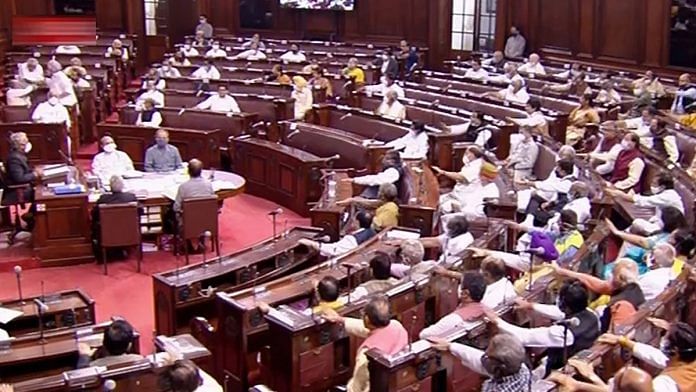New Delhi: The Rajya Sabha has decided to use gender-neutral terms in responses to parliamentary questions from the next session onwards.
The announcement, which was made Tuesday, came in response to a request made by Shiv Sena MP Priyanka Chaturvedi last month (8 August). In a letter addressed to Union Minister of Parliamentary Affairs Pralhad Joshi, Chaturvedi said that use of the phrase “no sir” in response to questions asked by women parliamentarians was “concerning”.
The Maharashtra MP Wednesday shared a screenshot of the reply she had received from the Rajya Sabha Secretariat (dated 20 September) and said it was a “small step” but will make a “big difference”.
Small step, big difference. Thank the Rajya Sabha Secretariat for correcting the anomaly in parliament question responses from ministries to women MPs. Henceforth the replies will be gender neutral from the ministries. pic.twitter.com/1m0hxBGmvn
— Priyanka Chaturvedi🇮🇳 (@priyankac19) September 21, 2022
The reply from the Rajya Sabha Secretariat said, “As per conventions and Rule of Procedure and Conduct of Business in Rajya Sabha, all proceedings of the House are addressed to the Chair. Replies to the parliamentary Questions being a part of the proceedings are also addressed to the Chairperson only. However, ministries will be informed to furnish gender-neutral replies to the parliamentary Questions from the next session of Rajya Sabha session.”
Meanwhile, when asked about the use of just “sir” in parliamentary responses, Desh Deepak Verma, former secretary general of Rajya Sabha, told ThePrint that he was not aware of such a practice and couldn’t understand what the new “gender-neutral” language would be.
“This is such common sense that if an answer is addressed to Priyanka Chaturvedi, there should be ‘madam’. Simple. There is no rule or law required for such an obvious thing,” he said.
Pradeep Chaturvedi, joint secretary, question branch at Rajya Sabha, told ThePrint, “According to rules, the minister addresses the chair. You would have seen how the Rajya Sabha chairman always reminds them (members) that they should address the chair when questioning or responding.”
The joint secretary also recalled how there were two women speakers at the Lok Sabha in the past and they were addressed accordingly.
“The questions addressed to Meira Kumar and Sumitra Mahajan used ‘yes madam’ and ‘no madam’. And normally, there is no need to write a salutation at all. So, only sometimes ‘yes sir’ or ‘no sir’ is used and that is also basically due to referring to the chair,” he said.
He also added that using “gender-neutral” language could entail writing just ‘yes’ or ‘no’ without any salutation, but the address would still be to the chair.
‘Concerning to observe institutional gender mainstreaming’
Chaturvedi’s letter had also evoked the “principle of equality” in the Parliament.
“In the answers provided for the questions raised in Parliament, the phrase ‘No Sir’ is often used in cases where the answer is negative. As a woman parliamentarian, it is concerning to observe the institutional gender mainstreaming by the temple of democracy — Parliament itself,” she wrote.
She had urged the Rajya Sabha authorities to “look into the practice” and requested “appropriate directions” to address parliamentarians.
“Although it may seem like a small change, it will go a long way in giving women their due representation in the parliamentary process,” she wrote in the letter.
There are currently 33 women members in the Upper House of the Parliament. It has been observed that women in leadership positions are often referred to as “chairmen” or “party men” and that an “alarming degree” of usage of masculine pronouns gives the impression of biased power structures.
“Despite certain course corrections, both Houses of Parliament and Central Ministries have failed in one common aspect. In a compilation of ministerial replies to questions from the 17th Lok Sabha so far for 75 women parliamentarians, it was found that 84% of the answers that used salutations (sir/madam) referred to women parliamentarians as ‘sir’,” an editorial in The Hindu said.
The editorial also said that it was not clear whether the issues stemmed from “pure administrative errors or ignorance of the rules of address”.
Also read: 7.22 lakh out of 22.05 crore applicants got govt jobs since 2014, Centre tells Lok Sabha



